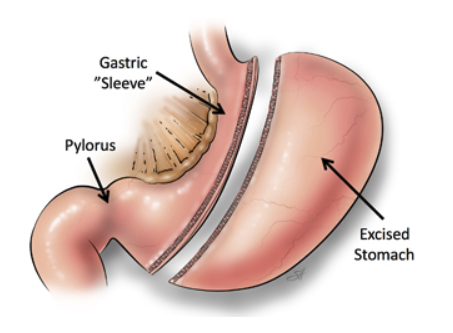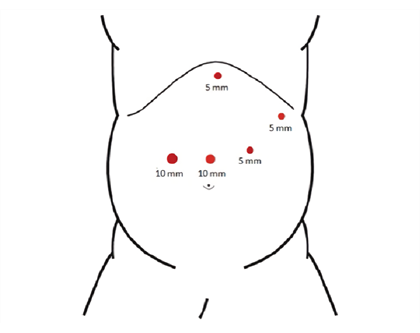Sleeve Gastrectomy
Sleeve gastrectomy is the removal of a large part of your stomach. This results in
both metabolic and restrictive changes that result in weight loss and generally
improvement in various comorbidities (such as Diabetes and Hypertension).
A Sleeve Gastrectomy is a major laparoscopic operation and requires lifestyle
changes to maximise the results for you.
How does the Sleeve Gastrectomy work?
Restrictive
The majority of the stomach is removed. Approximately 100ml 'sleeve' of the
stomach remains (<15% of the stomach). This then results in less food being
consumed and with 'early satiety', this is the sensation of feeling full and satisfied
after eating smaller volumes and thus less calories consumed.
Other factors
Metabolic and hormonal changes occur after the operation. There are changes in the
amount of hormones and signals sent from the remaining stomach to the body, that
'turn down' your appetite and also creates "early satiety ". Your body also responds
by controlling glucose and fats better within the bloodstream (less insulin resistance-
which is the hallmark of type 2 Diabetes.
Lifestyle
Only with lifestyle changes can any Bariatric surgery be effective. These include
regular exercise, healthy eating, stopping smoking and avoiding high-calorie foods.
Who benefits from a Sleeve Gastrectomy
People who are committed to lifestyle changes and psychologically prepared with a;
- BMI >35
- BMI >30 with comorbidites (Diabetes / Obstructive Sleep Apnoea / Joint
disease)
Who has attempted several months of weight loss without desired results and no
contraindication to surgery (liver / kidney failure, critical heart disease
The benefits of weight surgery are greatest in people under 65yrs. This is due to the
reversibility of the comorbidities and risks of surgery. Patients with lower BMI (30-35)
can be discussed on a case by case basis.
Any Bariatric operation is a partnership between the Surgeon and the Patient
What are the benefits of the Sleeve Gastrectomy?
- Weight loss of between 70-75% excess body weight
- Resolution of comorbidities
- Diabetes (approx 70-80%)
- High blood pressure
- Obstructive sleep apnoea
- Halt deterioration of weight related conditions
- A BMI >40 is equivalent to smoking in shortening ones life expectancy
What are the contra-indications to a Sleeve Gastrectomy?
- Moderate/Severe acid reflux ("Heartburn")
- If not prepared to undergo lifestyle and dietary changes
- Significant medical comorbidities (Cirrhosis of liver / Heart failure etc…)
Preoperative cares
- Continued dietary and lifestyle changes.
- Strongly recommended to stop smoking and reduce alcohol intake. Post
operatively it is recommended to avoid alcohol completely for 6 months
- Stabilisation / optimisation of co-morbidities (Diabetes / High blood pressure)
2-3 weeks before surgery you commence the OPTIFAST diet, a very low-
calorie diet (VLCD) that is <800kcal per day that completely replaces your
meals / diet (Nutritionally complete).
This achieves further weight loss and decreases the size of your liver improving
surgical access, safer surgery and fewer complications
Dietician Review
All patients will be assessed by our Dietician
This is to:
- Optimise preoperative weight loss
- Education surrounding a healthy diet
- Prepare yourself for the dietary changes necessary after surgery
Psychologist Review
All patients will be assessed by our psychologist. This is routine and been shown to
improve one 's understanding around the operation and the post-operative effects on
your life.
Risks of surgery
- Death - very low; between 1-2/1000 patients
- Bleeding - 1% chance of blood transfusion
- Leak - 1%. From staple line. This is a serious
complication. That may
result in further surgery and prolonged hospital stay.
- Conversion - <1% risk of a large scar
- Injury to bowel - <1%. From the insertion of the laparoscopic ports
- Vomiting - <5%. This occasionally occurs from kinking / twisting of the
stomach tube. Generally resolves within 4 weeks
- Medical complications - DVT (clots in leg veins), Heart attacks, Skin
infections, Stroke, Pancreatitis - all unlikely
Long term concerns
- Increased acid reflux symptoms - Association of increased reflux
symptoms after Sleeve surgery (Approx 20%). Unclear cause
- Smaller meals - Smaller stomach volume after surgery
- Dehydration - Due to smaller volume fluid drunk
- Excessive weight loss - slow sustained weight loss best
- Nutritional Deficiencies - Multivitamins taken postoperatively may be
required. Calcium and Iron are the most common deficiencies resulting in
osteoporosis and anaemia respectively. These are generally mild.
- Psychological - Depression, anxiety and adjustment disorders can occur in
the longer term
- Gallstones - Not infrequently stones develop following Sleeve surgery.
Management is dictated by symptoms
- Abdominal bloat/ vomiting - Due to various causes. Can be due to
"dumping " of food into the small intestine, internal scars, or angulation of the
sleeve. The Latter may require intervention (Surgery or Endoscopic dilation)
- Hernia - Through surgical scars = "Port site " hernia. Internal hernias not
seen
in Sleeve Gastrectomy
Sleeve Gastrectomy summary
Advantages
- Rapid weight loss as hunger and satiety control well tolerated. Most near
target weight by 1 year with maximal weight loss at 18 months
- The continuity of the gastrointestinal tract is preserved so that many of the
nutritional complications seen with Bypasses are avoided.
- Recovery time is rapid with most patients returning to work in a week or two.
No heavy lifting 4-6weeks
Disadvantages
- Leaks from staple line can occur (1%), which would require hospitalisation
and re-intervention.
- Possibly 5-10% of patients may require revisional surgery due to weight
regain (at 5-10+ years).


